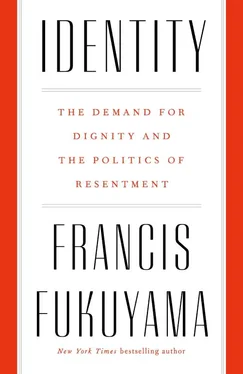A third problem with current understandings of identity is that they can threaten free speech and, more broadly, the kind of rational discourse needed to sustain a democracy. Liberal democracies are committed to protecting the right to say anything you want in a marketplace of ideas, particularly in the political sphere. But the preoccupation with identity has clashed with the need for deliberative discourse. The focus on lived experience by identity groups valorizes inner selves experienced emotionally rather than examined rationally. Notes one observer, “Our political culture is marked, at the micro level, by the fusion of a given person’s opinion and what they perceive to be their singular, permanent, and authentic self.” This privileges opinions sincerely held over reasoned deliberation that may force one to abandon those opinions. {11} 11 Maximillian Alvarez, “Cogito Zero Sum,” Baffler , August 2, 2017, https://thebaffler.com/the-poverty-of-theory/cogito-zero-sum-alvarez .
That an argument is offensive to someone’s sense of self-worth is often seen as sufficient to delegitimize it, a trend encouraged by the kind of short-form discourse propagated by social media. {12} 12 An example of this is the treatment of Rebecca Tuvel for her article “In Defense of Transracialism,” published in Hypatia: A Journal of Feminist Philosophy , as described by Kelly Oliver in “If This is Feminism…,” Philosophical Salon , May 8, 2017, http://thephilosophicalsalon.com/if-this-is-feminism-its-been-hijacked-by-the-thought-police/ . See also Kelly Oliver, “Education in an Age of Outrage,” New York Times , October 16, 2017.
The political strategy of building a left out of a coalition of disparate identity groups is problematic as well, as Mark Lilla has explained. {13} 13 Mark Lilla, The Once and Future Liberal: After Identity Politics (New York: HarperCollins, 2017).
The current dysfunction and decay of the American political system is related to the extreme and ever-growing polarization of American politics, which has made routine governing an exercise in brinkmanship and threatens to politicize all of the country’s institutions. The blame for this polarization is not equally shared between left and right. As Thomas Mann and Norman Ornstein have argued, the Republican Party has moved much more rapidly toward the extremist views represented by its Tea Party wing than has the Democratic Party to its left. {14} 14 Thomas E. Mann and Norman J. Ornstein, It’s Even Worse Than It Looks: How the American Constitutional System Collided with the New Politics of Extremism (New York: Basic Books, 2012).
But the left has moved further to the left as well. In doing so, both parties are responding to the incentives that a two-party electoral system and popular primaries give to politically conscious activists. The activists most concerned with identity issues are seldom broadly representative of the electorate as a whole; indeed, their concerns have often alienated mainstream voters. Moreover, the very nature of modern identity with its emphasis on lived experiences creates conflicts within the liberal coalition. For example, controversies over “cultural appropriation” have set progressive blacks and whites against one another. {15} 15 Cultural appropriation refers to the efforts of someone of one race, ethnicity, or gender to make use of or profit from the culture of another group. In one notable case, a painting by artist Dana Schutz of Emmett Till’s mutilated corpse led to demands that the painting be destroyed on the grounds that she was a white painter depicting a moment traumatic for black people. In another case an editor was forced to step down from his position at the Canadian Writers Union for a piece defending the right of white authors to create characters from minority or indigenous backgrounds. In both cases the individuals being criticized were themselves liberals trying their best to sympathetically understand the experiences and sufferings of people from minority backgrounds. The text of Hannah Black’s letter criticizing Dana Schutz is given at https://i-d.vice.com/en_uk/article/d3p84a/black-artists-urge-the-whitney-biennial-to-remove-painting-of-murdered-black-teenager-emmett-till . See also Kenan Malik, “In Defense of Cultural Appropriation,” New York Times , June 14, 2017; Lionel Shriver, “Lionel Shriver’s Full Speech: ‘I Hope the Concept of Cultural Appropriation Is a Passing Fad,’” Guardian , September 13, 2016.
The final, and perhaps most significant, problem with identity politics as currently practiced on the left is that it has stimulated the rise of identity politics on the right. Identity politics gives rise to political correctness , opposition to which has become a major source of mobilization on the right. Since the latter term became a central issue in the 2016 U.S. presidential election, it is necessary to step back a bit and think about the origins of the phrase.
Political correctness refers to things you can’t say in public without fearing withering moral opprobrium. Every society has certain ideas that run counter to its foundational ideas of legitimacy and therefore are off-limits in public discourse. In a liberal democracy, one is free to believe and say in private that Hitler was right to kill the Jews, or that slavery was a benevolent institution. Under the U.S. First Amendment, one’s right to say these sorts of things is also constitutionally protected. But considerable moral opprobrium would rightly be brought to bear against any political figure espousing such views, since they run counter to the principle of equality enunciated in the American Declaration of Independence. In many European democracies that do not have the same absolutist view of free speech as the United States, similar statements have been criminalized for many years.
But the social phenomenon of political correctness is more complex than this. The constant discovery of new identities and the shifting grounds for acceptable speech are hard to follow: manholes are now referred to as maintenance holes ; the name of the Washington Redskins football team is denigrating to Native Americans; the use of he or she in the wrong context denotes insensitivity to intersex or transgender people. The eminent biologist E. O. Wilson once had a bucket of water dumped on his head for suggesting that some gender differences had biological grounds. None of these words have any significance for fundamental democratic principles; what they do is challenge the dignity of a particular group and denote lack of awareness of or sympathy for that group’s particular challenges and struggles.
The more extreme forms of political correctness are in the end the province of relatively small numbers of writers, artists, students, and intellectuals on the left. But they are picked up by the conservative media and amplified as representative of the left as a whole. This may then explain one of the extraordinary aspects of the 2016 U.S. presidential election, which is Donald Trump’s continuing popularity among a core group of supporters despite behavior that would have ended the career of any other politician. In his campaign he mocked a disabled journalist; he was revealed to have bragged that he had groped women; and he characterized Mexicans as rapists and criminals. While many of his supporters may not have approved of each individual statement, they liked the fact that he was not intimidated by the pressure to be politically correct. Trump was the perfect practitioner of the ethics of authenticity that defines our age: he may be mendacious, malicious, bigoted, and unpresidential, but at least he says what he thinks.
By taking on political correctness so frontally, Trump has played a critical role in moving the focus of identity politics from the left, where it was born, to the right, where it is now taking root. Identity politics on the left tended to legitimate only certain identities while ignoring or denigrating others, such as European (i.e., white) ethnicity, Christian religiosity, rural residence, belief in traditional family values, and related categories. Many of Donald Trump’s working-class supporters feel they have been disregarded by the national elites. Hollywood makes movies with strong female, black, or gay characters, but few centering around people like themselves, except occasionally to make fun of them (think of Will Ferrell’s Talladega Nights ). Rural people, who are the backbone of populist movements not just in the United States but in Britain, Hungary, Poland, and other countries, often believe that their traditional values are under severe threat by cosmopolitan, city-based elites. They feel victimized by a secular culture that is careful not to criticize Islam or Judaism, yet regards their own Christianity as a mark of bigotry. They feel that the elite media have put them in danger by their political correctness, as when the mainstream German press failed to report for several days an incident of mass groping and sexual assault by a crowd of mostly Muslim men at a 2016 New Year’s celebration in Cologne, all for fear of stoking Islamophobia.
Читать дальше












